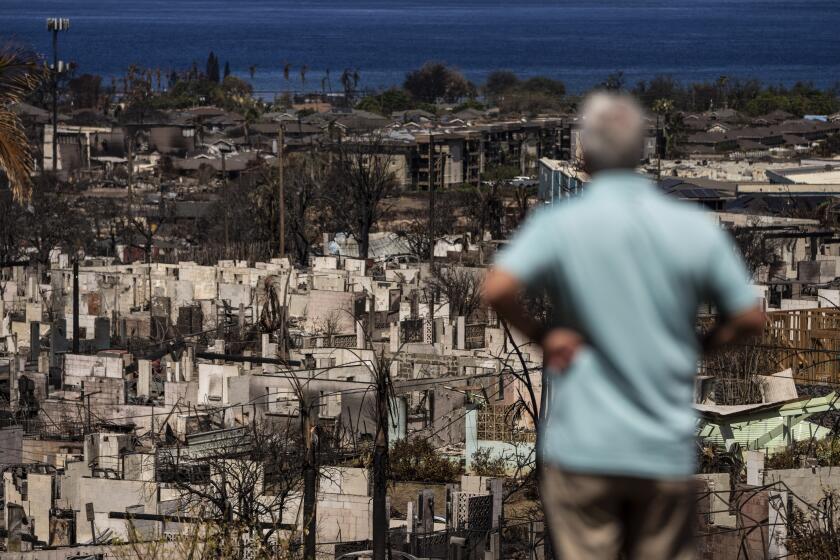Parks Proposal Alarms Activists
Environmental groups reacted with alarm to the Bush administration’s announcement that it intends to allow increased snowmobile use in Yellowstone National Park.
The park’s proposed winter management plan was unveiled Tuesday, and critics were quick to note that the environmental impact statement omitted details of how the snow machines would affect the park’s wildlife, noise levels and air quality. A handful of groups is expected to sue to prevent the policy from being implemented.
The plan, which is not final, would reverse a ban on snowmobiles in Yellowstone and Grand Teton national parks set by the Clinton administration that was to take effect next year. The new proposal imposes the first-ever daily cap on snowmobiles entering the parks, but its net effect would be to allow 35% more of the machines than typically visit.
Park officials characterized the plan as a compromise among snowmobile enthusiasts and manufacturers -- who favor unlimited access -- and those who call for enforcement of the ban. If adopted, the policy would go into effect in March.
For environmental groups that have been tracking the issue for decades, the draft proposal sets a questionable precedent.
“We feel that this is really a setback for national park protection nationwide,” said Steve Bosak of the Washington-based National Parks Conservation Assn. “If they can go in and meddle with a decision that was founded on years of scientific research and based on laws that defend our parks -- and was well supported by the majority of the American public -- who’s to say they won’t favor a special interest that will mess up another park?”
The Park Service received more public comments on the snowmobile issue than any other in agency history, and 80% of respondents favored a ban. Until recently, the Park Service had concurred -- issuing the ban after 10 years of study and following recommendations from the Environmental Protection Agency and the Occupational Safety and Health Administration.
For several years, park rangers have worn respirators and worked in kiosks that require fresh air to be pumped in. This season, which begins in mid-December, some rangers will be fitted with sophisticated hearing protection.
“You have to wonder what Teddy Roosevelt would think,” said Jon Catton of the Greater Yellowstone Coalition, an environmental group based in Bozeman, Mont. Yellowstone was made the first U.S. national park in 1872. Theodore Roosevelt, the 26th president, visited.
“Imagine: ‘Welcome to Yellowstone, Mr. Roosevelt. Here are your earplugs. We recommend you wear this mask over your nose and mouth.’ Would Teddy Roosevelt call this decision balanced, a compromise, a real solution?”
Yellowstone superintendent Suzanne Lewis acknowledged the intense interest in the snowmobile management policy, which she said would cost $1 million to set up and $500,000 a year to maintain. “Clearly, this is one of the most complex issues the National Park Service has ever faced,” Lewis said. “It’s been debated for more than a decade.”
The policy would require that 80% of the snowmobiles entering the park be led by commercial guides using new-generation four-cycle engines, reported to be quieter and less polluting. The general public would be able to enter the park on traditional two-stroke engines until the 2004-05 season.
Park officials said noise and air pollution monitors would be placed around the park to gauge the new snowmobiles’ effects. Yellowstone has a goal of reducing hydrocarbons by 90% and carbon monoxide by 70%.
In a conference call with reporters Tuesday, officials gave few specifics about the plan’s scientific underpinings, other than to say the policy would preserve the park’s resources.
“Americans don’t want protection of Yellowstone National Park weakened,” Catton said. “The administration’s plan clearly lowers the level of protection.
“Our first priority is to ensure that the administration reveals the inherent harm in its plan. The public deserves to hear not a script that satisfies the snowmobile industry, but the facts of what this plan does to Yellowstone’s air quality, wildlife and peace and quiet.”
More to Read
Start your day right
Sign up for Essential California for news, features and recommendations from the L.A. Times and beyond in your inbox six days a week.
You may occasionally receive promotional content from the Los Angeles Times.







